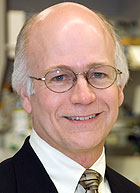About 40 percent of African-Americans have a genetic variant that can protect them after heart failure and prolong their lives, according to research conducted at the School of Medicine and collaborating institutions.
The genetic variant has an effect that resembles that of beta blockers, drugs widely prescribed for heart failure. The study offers a reason why beta blockers don’t appear to benefit some African-Americans, the subject of controversy in the cardiovascular field.

“By mimicking the effect of beta blockers, the genetic variant makes it appear as if beta blockers aren’t effective in these patients,” said senior author Gerald W. Dorn II, M.D., professor of medicine, associate chairman for translational research and director of the WUSTL Center for Pharmacogenomics.
“But although beta blockers have no additional benefit in heart failure patients with the variant, they are equally effective in Caucasian and African-American patients without the variant,” Dorn said.
Co-author Stephen B. Liggett, M.D., professor of medicine and physiology at the University of Maryland School of Medicine and director of its cardiopulmonary genomics program, said the discovery adds to the accumulating evidence that genetic differences contribute to the way people respond to medications and should encourage the use of genetic testing in clinical trials to identify people who can benefit from therapy tailored to their genetic makeup.
About 5 million people in the United States have heart failure, and it results in about 300,000 deaths each year. Beta blockers slow heart rate and lower blood pressure to decrease the heart’s workload and prevent lethal cardiac arrhythmias.
While Caucasians with heart failure participating in clinical studies of beta blockers have shown clear benefit from the drugs, the evidence for benefit in African-Americans has been ambiguous. The study, reported online April 20 in Nature Medicine, identified one particular race-specific gene variant that seems to account mechanistically and biologically for these indeterminate results.
The gene codes for an enzyme called GRK5, which depresses the response to adrenaline and similar hormonal substances that increase how hard the heart works. Adrenaline is a hormone released from the adrenal glands that prompts the “fight-or-flight” response — it increases cardiac output to give a sudden burst of energy.
In heart failure, decreased blood flow from the struggling heart ramps up the body’s secretion of adrenaline to compensate for a lower blood flow. Overproduction of the hormone makes the weakened heart pump harder but eventually worsens heart failure.
Beta blockers alleviate this problem by blocking adrenaline at its receptor in the heart and blood vessels. GRK enzymes mimic this effect by serving as “speed governors” that work like the governor in an engine to prevent adrenaline from over-revving the heart, Dorn said.
The researchers — including three equally contributing co-authors: Liggett, Sharon Cresci, M.D., assistant professor of medicine in the Cardiovascular Division and a cardiologist at Barnes-Jewish Hospital, and Reagan J. Kelly, a Ph.D. candidate in the School of Public Health at the University of Michigan — found that 41 percent of African-Americans have a variant GRK5 gene that more effectively suppresses the action of adrenaline than the more common version of the gene.
People with the variant gene could be said to have a natural beta blocker, Dorn said. The variant is extremely rare in Caucasians, accounting for its predominant effects in African-Americans.
The researchers showed that African-American heart failure patients with this genetic variant have about the same survival rate even if they don’t take beta blockers as Caucasian and African-American heart failure patients who do take beta blockers.
“Our study demonstrates a mechanism that should lay to rest the question about whether beta blockers are effective in African-Americans — they absolutely are in those who don’t have this genetic variant,” Dorn said.
Other institutions collaborating in the study are the University of Cincinnati, Thomas Jefferson University and the University of Missouri-Kansas City.